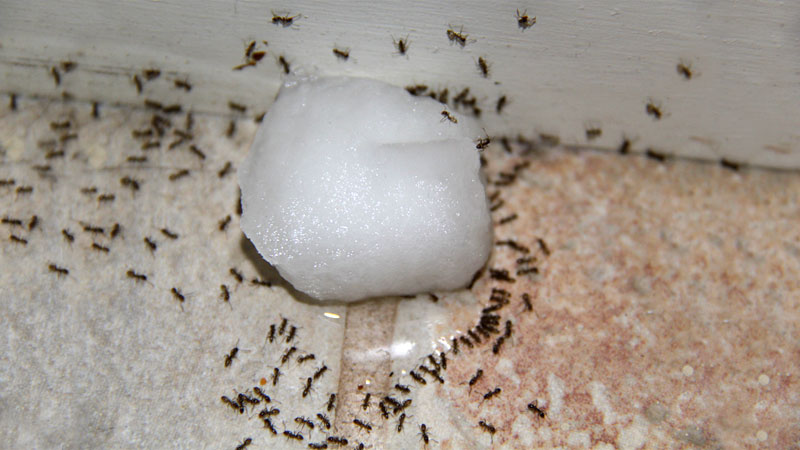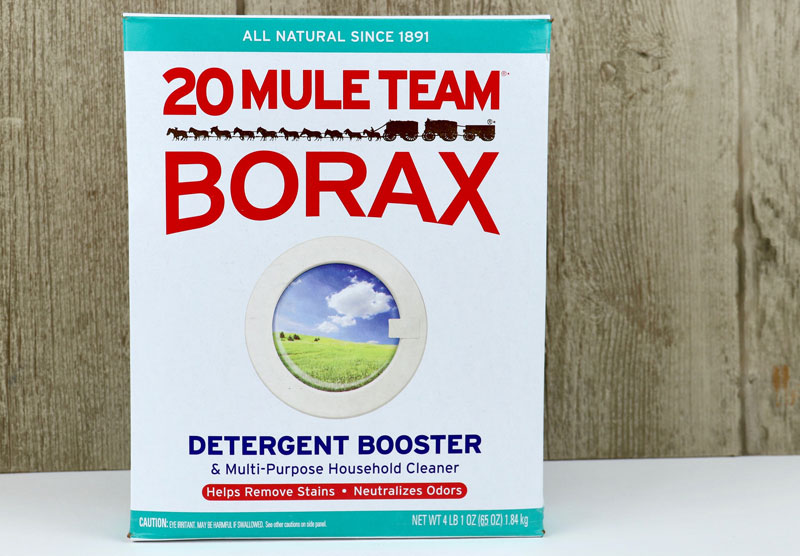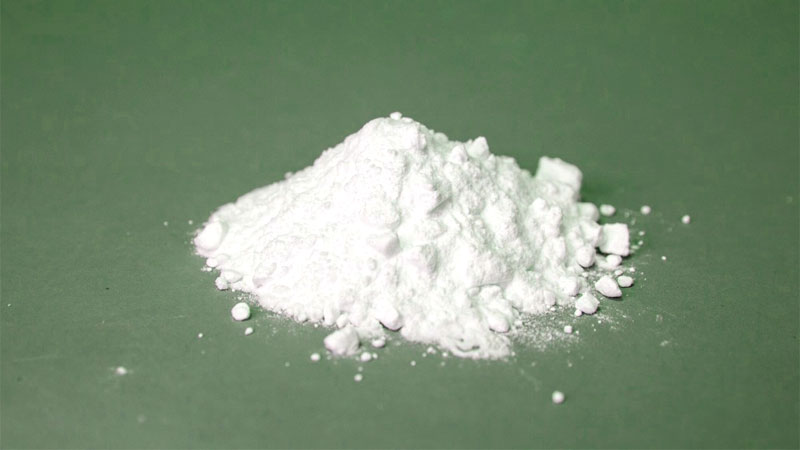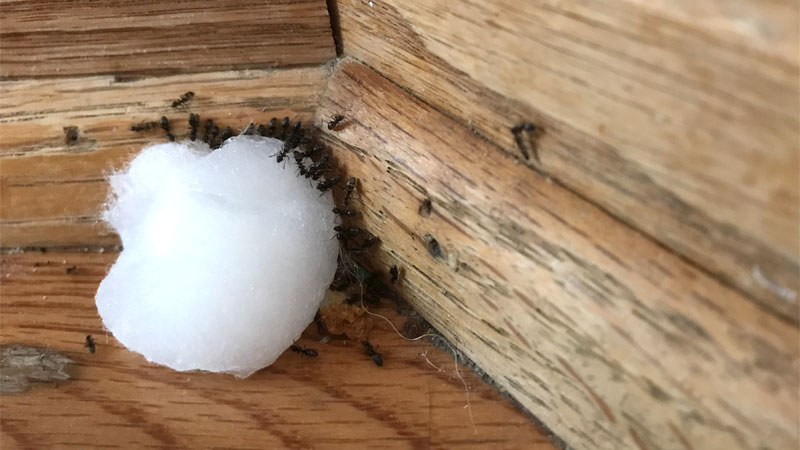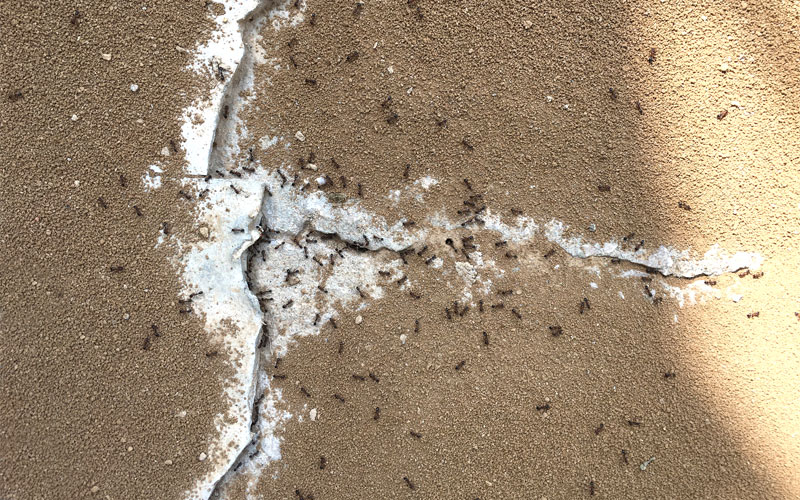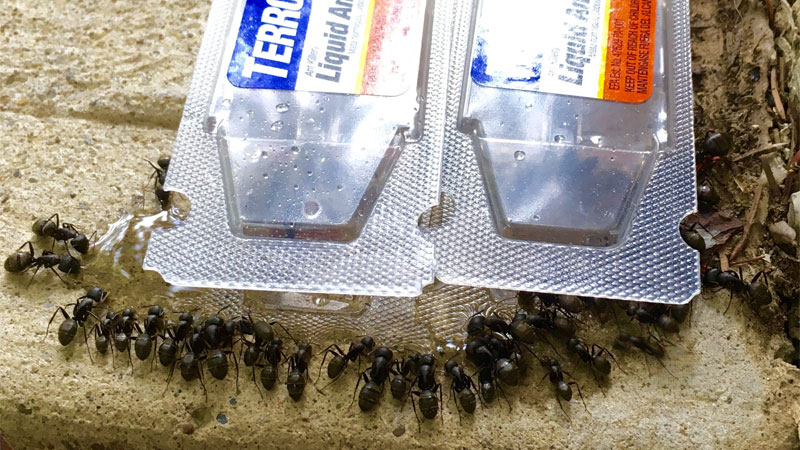Ants are one of those little pests that seem to appear out of nowhere, only to suddenly swarm a spot you likely thought they’d never get to. They can get into your food, march in an endless line along your countertops, and protect aphids and other plant and garden pests from natural predators.
Suffice it to say, ants are one of the top 5 most common and annoying household and garden pests out there.
But while there are countless commercial products available, they can also be harmful for the environment. Thus, if you’re like us, you’re always looking for a natural, safe remedy. Borax, a common household product, may well be one of those remedies.
But what is borax, how does it work, and is it really safe? Let’s dig in and see if the hype is justified.
Borax 101
Chances are, you’ve seen borax or even used it before without knowing. While not found under the sink as often as it was a few decades ago, this product is starting to return to the limelight.
What is Borax?
Borax is a naturally-occurring mineral containing boron. It was originally discovered in Kashmir and Tibet, but is now extracted globally. In fact, there’s a good chance the borax you buy came from Southern California.
Borax is actually a small family of closely related minerals bearing a few different scientific nicknames, including sodium borate, sodium tetraborate, and disodium tetraborate, depending on the exact composition.
It’s used in numerous domestic and commercial applications, such as cosmetics, dental products, disinfectants and detergents, glassmaking, lawn care, pottery, and welding.
The single most famous borax powder product is 20 Mule Team Borax, which was named for the primary transportation method used in Death Valley and has been a staple of households for more than 100 years. However, other brands exist, and borax may be purchased as a liquid, paste, powder, spray, or tablet.
Is Borax Safe to Use?
This is a matter of some confusion for many people due to conflicting information. The truth of the matter is that borax is generally considered safe and non-toxic WHEN USED EXTERNALLY AND RESPONSIBLY.
In trace amounts, borax may be safely used in healthcare and cosmetic products, but should not be mixed at home unless you know what you’re doing.
Ingestion of borax or other forms of boric acid can cause a host of symptoms, especially in children. These symptoms include abdominal pain, diarrhea, nausea, and vomiting. Infants may also suffer damage to the nervous system, resulting in coma, confusion, convulsion, or contortions in posture.
Even in adults, eating large amounts can result in a red skin rash and skin loss. Depending on the type and amount ingested, the vomit or stool may take on a bluish-green tint.
When borax gets into the eyes, it can cause corrosion. Breathing in borax dust can also create a range of symptoms, including coughing, nosebleed, respiratory dryness, shortness of breath, or sore throat.
It’s thus best to wear protective clothing, including eye and nose coverings when handling borax in powder form, and to wash your hands after handling borax products. Keep away from pets and small children.
Finally, be aware that wildlife may be at risk of accidental exposure to borax when used outdoors and may try to consume the bait, so use with caution.
Is Boric Acid the Same as Borax?
While closely related, these two boron-based products are different. Borax tends to be found naturally in colemanite, kernite, and tourmaline. Boric acid, meanwhile, is naturally found in sassolite.
Borax may also be refined to create boric acid when mixed with hydrochloric acid.
Borax vs Ants
While borax can kill ants, the success rates can vary from one species to another due to social structures and type of bait used, as well as bait placement. Thankfully, what borax does to an ant’s body is universal. It can even kill other pests such as roaches and silverfish.
How Does Borax Kill Ants?
Borax has no effect on ants topically, but can be quite deadly once consumed. This is the opposite of salt’s effect on ants. The borax produces gas within their digestive systems, which the ants can’t dispel. As a result, they become unable to eat.
Even more importantly, ants will carry baited borax back to their nests where it will affect other ants. Remember, ants naturally know to avoid borax, so it won’t work on its own.
Will Borax Kill the Queen Ant?
If ingested, borax will kill the queen, dooming her entire colony. However, this process can take a long time, as the borax bait must reach the queen’s nursemaids who’ll then feed her the poison.
As a general rule, adult workers will prefer to target liquid baits, although any ant larvae which are fed a solid bait will convert it to liquid.
How Long Does It Take for Borax to Work?
Borax isn’t an instant remedy. Instead, it takes 48 to 72 hours to begin noticing the effects. Part of this is because the worker ants are taking the poisoned bait back to their colony and sharing it with others.
Not all ants will be foraging in the same location, so they have to be affected secondhand. This also means you need to replenish the bait or the ants will reappear after a few days.
Is There Anything I Can Use Instead of Borax?
You might have some concerns over the toxicity of borax towards pets, beneficial insects, and even plants in large quantities. Thankfully, there are a few alternatives you can use.
Baking Soda
Plain old baking soda performs essentially the same functions as borax and may be substituted in most borax recipes.
Diatomaceous Earth
Diatomaceous earth is a natural product that’s generally safe around kids and pets. It lacerates the exoskeletons of insects, causing them to die of fluid loss. Just be warned, it’s not pleasant breathing in this fine powder, so you should still be careful when using it.
How to Use Borax to Kill Ants
There are quite a few recipes out there, but the following are some of the most popular and effective.
Use Different Traps for Different Species
Not all species are alike, and one of the biggest mistakes people make is to try and use the same technique for every type of ant. Many ants are omnivores, but others focus on a specific type of food.
In the event you cannot identify the species, you will need to consult with licensed pest control experts or try a few different types of trap at once. The three biggest considerations are:
Omnivores
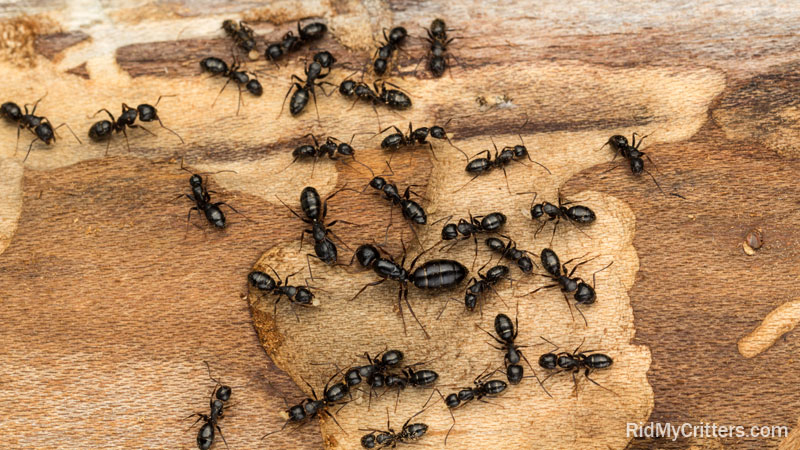
Many ant species are omnivores, and both protein and sugar traps will usually work on them. Some common omnivorous species include:
- Carpenter Ant
- Funnel Ant
- Ghost Ant
- Pharaoh Ant
Protein Ants
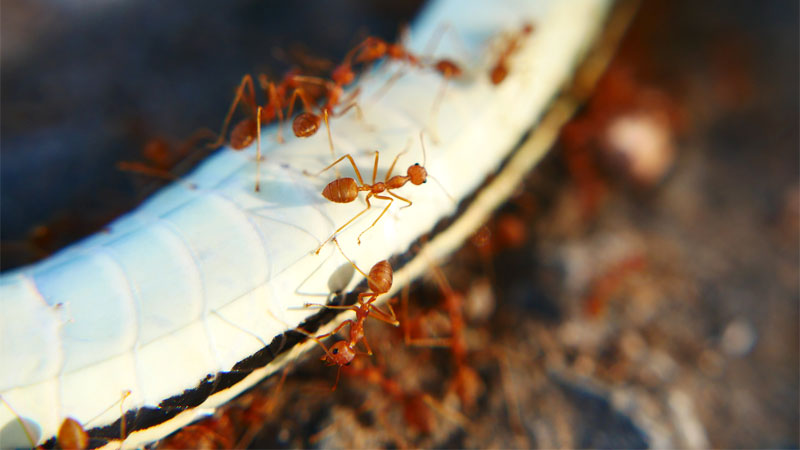
Some ants harvest proteins instead of sugars. These species will ignore sugary traps, but a protein such as peanut butter can be highly effective. Some common protein ant species are:
- Big-Headed Ant (AKA Coastal Brown Ant)
- Bulldog Ant
- Fire Ant
- Grease Ant (AKA Thief Ant)
- Green-Headed Ant
- Southern Meat Ant
- Tyrant Ant
Related: 4 Products That Eliminate Fire Ants
Sugar Ants
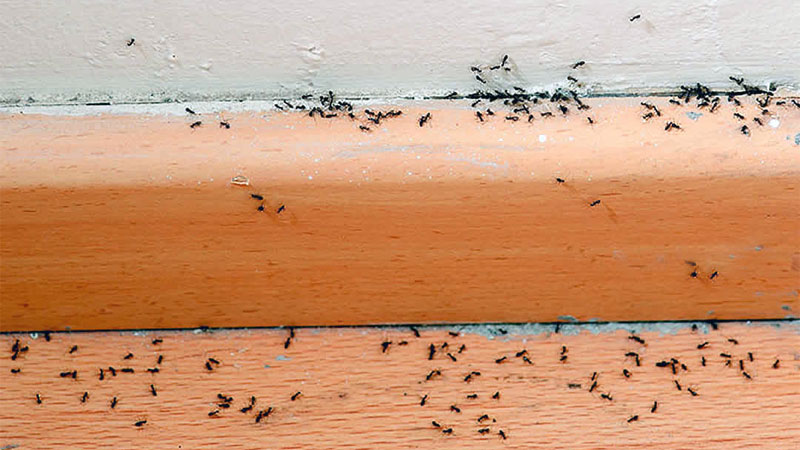
Sugar ants are ant species that harvest sap and other sugars as their primary diet. While there’s an actual species called the sugar ant in Australia, the moniker is used to describe numerous species in the US. Some examples of sugar ants include:
- Acrobat Ant
- Argentine Ant
- Cornfield Ant
- False Honey Ant
- Little Black Ant
- Odorous House Ant
- Pavement Ant
- Rover Ant
A Note on Satellite Colonies
Some species create satellite colonies to cover a broader territory. These satellites lack their own queens and may be located some distance from the main colony. Carpenter ants are the most famous example of a species with a satellite colonial structure.
Borax will only work against the immediate colony, so it may be necessary to locate the main colony outside before an infestation will completely disappear.
Commercial vs Homemade
Commercial borax ant baits are actually fairly common. Many of these are gel baits like the popular Terro Liquid Ant Killer and are stored in a bait tray. Some others are granular baits.
Purchasing a commercial borax ant killer is more expensive than a homemade ant bait made from borax and other common ingredients, but are sometimes more effective. The reason for this is that the commercial bait mixture usually includes other insecticidal ingredients so the actual borax concentration is much lower.
As these extra ingredients may also increase the toxicity of store-bought baits, you may prefer to use homemade bait traps instead.
Homemade Borax Ant Killer Recipes
#1 – Sugar Bait
This recipe can have plenty of variation. However, the key is to make sure the mixture doesn’t have too much borax, as the ants will detect a poor ratio and avoid the bait.
As a general rule, mix 3 parts sugar (it can be granular or powdered sugar) with 1 part borax. For example, 3 teaspoons sugar + 1 teaspoon borax. You may choose to apply the mixture dry or as a paste.
The dry confectioner’s version is excellent for dusting ant hills and entry points. The paste can be used to create small traps. Meanwhile, you can dip cotton balls in a paste mixture of 1/3 cup of sugar, 1 tbsp borax, and 3/4 cup warm water for an effective bait station.
Overall, using sugar is quick and easy, but mileage varies greatly.
#2 – Honey Trap
Honey traps are better for killing workers than attacking a colony. Mix ½ cup honey, ¼ cup borax, and 2 tbsp boiling water to form a sticky paste. Smear this on tape or a lid to serve as a sticky trap. Note that the mixture will need to be replaced after it dries.
This mix generally has far too much borax to trick ants into eating it. However, you may wish to try cutting the borax content in half if you’re trying to attack the colony itself. As a sticky trap, it can be fairly effective, though.
#3 – Sweet Borax Spray
While honey isn’t the best killer on its own, you can make an effective contact spray using honey. To make the spray, thoroughly mix 2 tbsp each of borax powder and sugar with 1 tbsp honey and 1 cup boiling water, then add to a spray bottle.
Spray the mixture wherever you see active ant trails or on ant hills. The honey will help make the mixture stick to any ants the spray hits, and they’ll eat it when they groom. They may also get some stuck to their legs as they walk, prompting ingestion.
#4 – Peanut Butter Bait
Perhaps the best medium for protein ants (such as thief ants), peanut butter bait is incredibly simple to make and use. Simply mix 1 tsp of peanut butter (creamy or powdered) with 2 tsp borax powder.
The wet bait can be stuffed into a straw and placed by an ant trail. Meanwhile the powder version may be sprinkled onto a paper or cardboard platform or even used to dust cracks and crevasses.
Is Borax Right for You?
As you can see, a few teaspoons of borax can really decimate an ant infestation, but there’s a bit of luck and trial involved. For example, you have to choose the right food source (sugar or protein), then put it where a trail of ants will find it but your kids and pets won’t.
You also have to make sure the concentration of borax isn’t too high or the ants will detect it.
All in all, it’s a great home remedy and can get pretty good results once you find the right recipe for your particular infestation. But when in doubt, don’t forget there are other remedies out there. And if worst comes to worst, the cost to hire a pest control professional probably isn’t as bad as you think.
- How to Get Rid of Hawks - March 8, 2024
- How to Get Rid of Pill Bugs (Rolly Pollies) - March 1, 2024
- How to Get Rid of Groundhogs (Woodchucks) - February 5, 2024

